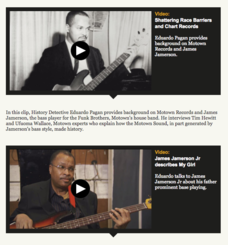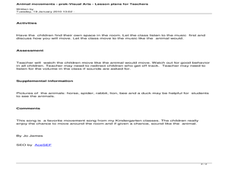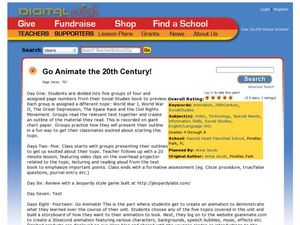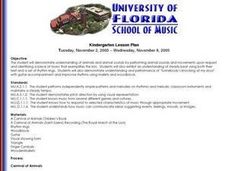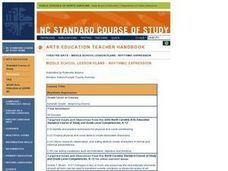Curated OER
Music Lesson Plan for Teaching Children with (Severe) Autism
Here's a packet of music activities designed specifically for children with autism. Kids learn greeting, echo, and repertory songs, as well as rhythmic patterns to play rhythm instruments.
Curated OER
Using Harmonic Vision’s Music Ace Software to Reinforce Basic Music Skills
If you have access to Harmonic Vision’s Music Ace Software, then this instructional activity could work for you. Kindergarteners use the video music software to place, identify, and read musical notes. They listen in and identify both...
Curated OER
Form and Observation
Use a familiar song and adorable baby animal pictures to teach youngsters about genetic variation. Begin by listening to "Twelve Variations on 'Ah vous dirai-je Maman,'" which you will need to find online (there are several versions...
Curated OER
Animal Movement
Students participate in a movement to music activity. In this awareness of movement lesson, students hear music and move like animals they hear described in the music. Students make disciplined movements and make sounds like animals.
Curated OER
Activity Plan Mixed Ages: Do the Animal Dance!
Students create a dance based on animal movements. In this kinesthetic lesson plan, the students will read and imitate animals in a creative way and share their dances with the group. The lesson includes a take-home activity and a math...
PBS
The Sixties: Hitsville USA
James Jamerson. You probably heard him but may not have heard of him. But fans of Motown Records will certainly recognize his contributions to the sound that desegregated popular music during the 1960s. Challenge young history detectives...
Curated OER
Learning Refrain and Verse
Instruct your young musicians on the terms verse and refrain. They listen to two songs, and point out the verse and refrain as they occur. Students then play drums when they hear the verse and the refrain. Note: Song lyrics, sheet music,...
Curated OER
Animal Movements
Students become familiar with the movement of various animals. In this animal movement lesson, students relate their knowledge of animal movements to the music they are moving to.
Curated OER
Animal Alphabet Book
Students identify each letter of the alphabet. They listen as the teacher reads an animal alphabet picture book. Students listen to the alphabet song. They create their own movements for the alphabet song. Students are asked to name...
Curated OER
Animation Station
Students examine clay animation. In this technology lesson, students use the Internet to investigate the history of clay animation. Students use story boards and clay figures to create their own "animation."
Curated OER
Go Animate the 20th Century!
Students create animations to match their social studies. in this 20th century lesson, students work in groups to read and present to their classmates World War I, World War II, The Great Depression, The Space Race, or the Civil Rights...
Curated OER
Somebody's Knocking At My Door
Students perform animal sounds and movements, demonstrate a steady beat using both feet, and perform portions of the song "Somebody's Knocking At My Door" in this Music lesson for the Kindergarten classroom. State and National Standards...
Curated OER
Animal Habitats
Students explore animal lifestyles by researching their characteristics. In this animal habitat lesson, students read the story Over in the Jungle and analyze the animal illustrations in the book. Students create clay animal characters...
Curated OER
A Matter of Survival
Fourth graders dance with inspiration from wild animals. In this creative movement lesson, 4th graders watch a video clip and then move like an animal might move in their natural surroundings.
Curated OER
Move it Like An Animal
Students investigate how animals move. In this animals lesson, students use pictures of animals and demonstrate how each of them moves from place to place.
Curated OER
Activity Plan Mixed Ages: Animal Antics
Students get moving in this activity. In this early childhood music and movement lesson plan, students develop their listening, gross motor, and language skills as they imitate animals.
Curated OER
Activities Using Music From Saint-Saens & Moussorgsky
Student create a fish and listen to music while imagining their fish are swimming. In this music lesson, students identify instruments played and move their fish to the movement. Students work with kangaroos and elephants to music as...
Curated OER
Rhythmic Expression
Students discover movement and expression to music/sound through a series of teacher-led exercises and role plays. This lesson is ideal for the middle school drama class with possibilities for adaptation to any level of drama or general...
Curated OER
The First Fire : A Cherokee Animal Tale
Fourth graders discover movement through the telling of "The First Fire", a Cherokee tale. Small groups are given sections of the story to tell by creating dances. Music (live and recorded) adds to the final performance and assessment.
Scholastic
Study Jams! Tides
The tide will turn in your earth science or oceanography unit when viewers see this clip. They learn that tides are caused by the gravitational pull of our moon, and are even impacted by the gravity of the sun. High, low, neap, and...
Curated OER
Primary PE lesson
Students participate in dances to a music CD to practice making a conga line formation. They then use locomotor movement shown on an animal picture card, moving to the music.
Curated OER
Do As I Do
Lead your class in practicing gross motor body movements. Put on some background music and lead them through hops, skips, jumps, leaps, and running in place. Think of animal movements and have them move like an elephant or slither like a...
Curated OER
Hey Good Looking, What You Got Cooking?
First graders perform a song and skit to illustrate how music can be used to communicate movement As part of the Thanksgiving Day program, 1st graders perform a song and skit that illustrates how music can be used to communicate movement.
Curated OER
Beat the Clock
Students discuss the importance of working together. After forming groups, they perform the movement based on their teacher's instructions. When asked to stop, they must sit down and form their groups immediately. If not, the game is over.







